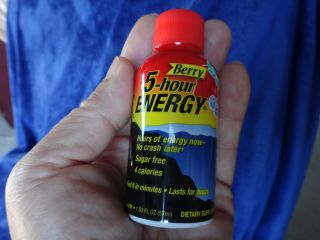

Energy Drinks – Hope and Hype Without Health


Energy Drinks – Hope and Hype Without Health
Tired out by the holidays? Energy can be yours. Instantly. You’ll work better. Perform better. Stay bright and alert (so claims of 5 Hour Energy)
Or you can achieve “Monster Energy”. In seconds, you can “Unleash Your Beast.”
The newest fracas about energy drinks, a $10 billion industry and the most rapidly growing beverage “segment” in the U.S., might almost be funny. Instead, the big joke’s on us. Selling expensive caffeine flavored with sugar and vitamins as, in Monster’s Phrase, “Lifestyle in a Can” proves three things:1. Money trumps health in American politics and economics. The physical, mental, and social well-being of the population – its health – doesn’t even have a place at the debate 2. Americans don’t like drugs - we love, love drugs – especially when you can sell them to kids, get them without a prescription, and tell folks they’re “safe”3. The placebo effect is amazingly powerful. It's time to use it to enhance health and improve our economy, not hook and abuse our youth.
The energy drink manufacturers know all about how the placebo effect. They use it in their advertising and marketing mercilessly. They’ve managed to convince tens of millions of kids and adults worldwide that their products are more effective than simple caffeine.
Except, as the New York Times pointed out recently, there’s effectively no evidence that energy drinks- what I’ve called anti-relaxation drinks – have any useful effect beyond their caffeine content.
But they certainly declare that they do “way more.” Here’s a sample of Monster’s Internet "Marketing" – (they explain that they don’t do advertising):
"Most companies spend their money on ad agencies, TV commercials, radio spots, and billboards to tell you how good their products are. At Monster we choose none of the above. Instead, we support the scene, our bands, our athletes and our fans. We back athletes so they can make a career out of their passion. We promote concert tours, so our favorite bands can visit your home town. We celebrate with our fans and riders by throwing parties and making the coolest events we can think of a reality...
In short, at Monster all our guys walk the walk in action sports, punk rock music, partying, hangin’ with the girls, and living life on the edge. Monster is way more than an energy drink. Led by our athletes, musicians, employees, distributors and fans, Monster is...
A "lifestyle in a can."
Drink Monster and you support renegade lifestyles, the coolest sports, the hippest bands. You are active, musical, sexy, transgressive, thrilling to “life on the edge.”
You’re even environmentally responsible.
Who can resist the power of energy?
Health Versus Hype
Caffeine is a powerful drug. Caffeinism is a known addiction.
But caffeine, in the form of coffee and tea, can be quite healthy. There’s evidence that coffee and tea – when used regularly and at set amounts – may help prevent Parkinsonism, diabetes, even future physical disability.
What’s the health evidence for energy drinks?
Miniscule. The companies don’t generally release their studies to the public – just “publicize” their "enormous" effects.
Yet there’s hardly any studies people can look at which demonstrate any effectiveness beyond caffeine. So does adding glucuronolactone, sugar, and B vitamins to caffeine improve performance and health?
At this stage, we have no generally accepted evidence that these added ingredients help. But it could they prove unhealthy?
Under FDA rules, you’re allowed to put together numerous “safe” ingredients together without checking their combination’s safety.
Physicians - like me – do this routinely. We treat different illnesses with different medications – all of which have side effects – knowing some of these “drug interactions” can prove dangerous or fatal.
But energy drink manufacturers get a free ride in terms of combining different “safe” elements. They don’t have to do clinical trials. They don’t have to prove safety.
It’s time they did. Unknown combinations should not be assumed to be safe. They’re not in medicine.
But then we’d be concerned with the nation’s health – rather than getting around FDA regulations for fun and profit.
The Cost of Energy
Energy drinks may not be safe – but they sure are expensive.
And there are lots of cheaper alternatives.
So let’s turn to one of our biggest retailers – Walgreens. Online you can buy six 5 Hour Energy Drinks for the ultra cheap price of $11.90.
But there’s no evidence that 5 Hour Energy provides anything useful at all beyond it’s 138 mg of caffeine per “shot”.
So for $11.90 (plus shipping) you get 828 mg of caffeine – admittedly in a cool bottle.
On Walgreens’ website you can also buy Natrol High Caffeine 200 mg tablets for $7.69 – 100 pills. That’s 20,000 mg of caffeine.
In tablet form that’s less 3.35 cents per 100 mg of caffeine. In 5 Hour Energy, it’s 144 cents for the same 100 mg – about 43 times more costly.
Or you could brew up a nice cup of coffee – with its many antioxidants and well loved flavor – for maybe 40 cents.
Packaging energy is profitable.
The Power of Placebo
By selling 10 billion bucks a year of “lightning in a can” energy drink manufacturers clearly demonstrate the power of placebo. Ten billion dollars ain’t bad for sticking together caffeine, water, and sugar – even if the money is dwarfed by other industries like cosmetics that combine amazingly cheap ingredients at prices beyond gold.
Now it’s time to unleash not “the beast” of Monster - but the same placebo power to improve the public health.
So let’s take just one billion dollars – a mere three thousandth of our health care bill of $2.9 billion a year – and give it to these superb marketers (we understand – Monster does not spend money on advertising). A billion is probably a lot less than energy drink makers advertising-marketing budgets each year. But this time we’ll get them to promote a single simple activity.
It’s an action almost everyone in the population can do - at any time. And it’s been shown to:
1. Make people live longer - even at age 85.
2. Make people feel and look younger.
3. Improve skin.
4. Prevent heart attacks.
5. Prevent strokes.
6. Prevent cancers.
7. Prevent Alzheimer’s disease.
8. Improve national energy independence.
9. Decrease obesity – and our nation’s obsession with weight.
10. Enhance the quality of life in towns and cities.
What’s the activity? The most natural thing in the world: walking.
And that’s no placebo.
Rather than hooking sleep deprived teenagers on caffeinated sugar to become sufficiently conscious to wake up for the school bus, the marketers of energy drinks could be making the country happier, quicker, more energetic, alive, creative, productive, economically competitive. And saving lives and hundreds of billions of dollars.
But then we’d be talking about health – a national conversation we’ll do almost anything to avoid.



